46 Gift Ideas for Kids with Autism: Sensory-Friendly and Developmental Picks
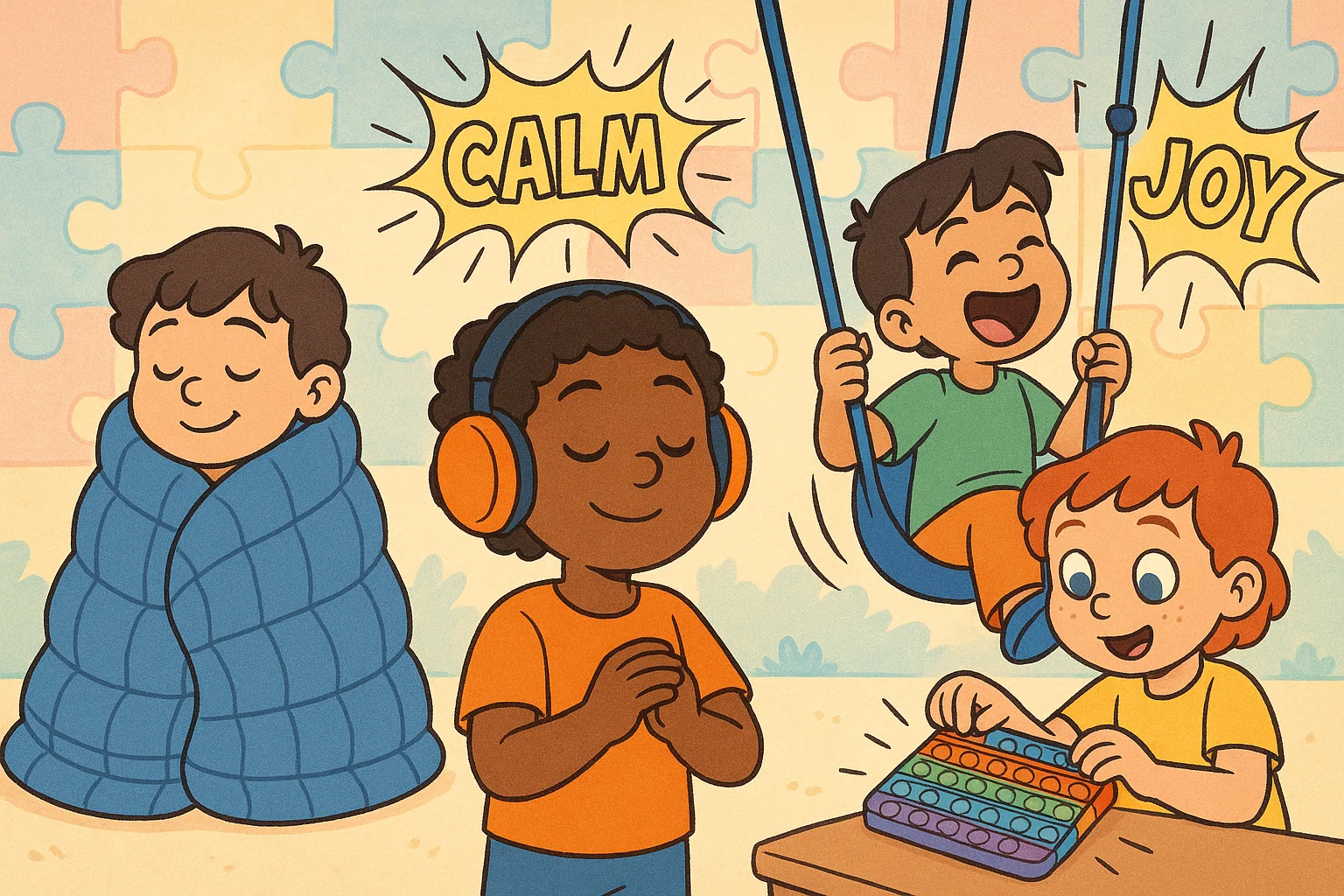
Choosing the right gift for children with autism spectrum disorder goes beyond typical toy shopping. Children on the autism spectrum have unique sensory needs, communication styles, and developmental patterns, which makes some gifts especially meaningful and beneficial.
The perfect gift for children can provide comfort, encourage learning, support sensory regulation, and create joyful engagement opportunities. This comprehensive gift guide explores sensory-friendly toys, educational materials, and practical items that truly make a difference in the daily lives of children who have autism – from toddlers to teenagers.
Sensory-Friendly Gift Ideas
Great gifts play a crucial role in helping kids with autism regulate their emotions, reduce stress levels, and maintain focus throughout their day. Children with autism spectrum disorder have unique sensory processing needs, experiencing either heightened sensitivity or seeking additional sensory input to feel comfortable and regulated.
Weighted Blankets
A weighted blanket provides deep pressure stimulation that can significantly improve sleep quality and promote feelings of security for children with autism spectrum disorder. The gentle, evenly distributed weight mimics the sensation of being hugged, which activates the parasympathetic nervous system and encourages relaxation.
When selecting these therapeutic tools, choose one that weighs about 10% of the child’s body weight, plus one or two extra pounds. For younger kids, ensure the covering isn’t too heavy and allows for easy movement. Look for breathable fabrics and removable covers for easy washing, as many children with autism have specific texture preferences.
Sensory Swings
Sensory swings offer vestibular input that helps improve balance, spatial awareness, and emotional regulation. The gentle rocking motion provides calming sensory stimulation that can reduce anxiety and help children feel more centered. Indoor swings create a safe space where kids can retreat when feeling overwhelmed.
Different swing styles serve various sensory needs – hammock-style swings provide full-body compression, while platform swings encourage different sitting positions and movement patterns. These swings are especially helpful for children who need movement input.
Noise-Cancelling Headphones
For children with sensory processing difficulties who are sensitive to auditory stimulation, noise-cancelling headphones can be life-changing tools. These devices help reduce overwhelming sounds in busy environments like schools, shopping centers, or family gatherings, allowing kids on the spectrum to participate more comfortably in various activities.
Look for headphones specifically designed for children, with adjustable headbands, comfortable padding, and volume limiting features. Some models also offer Bluetooth connectivity, enabling kids to listen to calming music or white noise while filtering out distracting background sounds.
Fidget Toys and Stress Balls
Portable fidget toys provide tactile engagement that helps kids with autism maintain focus and manage stress. These small tools offer sensory input through squeezing, stretching, or manipulating, which can be particularly helpful during transitions, waiting periods, or challenging tasks.
Choose fidget toys made from safe, durable materials that won’t break into small pieces. Consider the individual’s specific preferences – some may prefer smooth textures while others enjoy bumpy or ridged surfaces. Stress balls with different resistance levels can help develop fine motor skills while providing calming sensory feedback.
Sensory Room Furniture
Creating a dedicated calming space at home becomes easier with specialized sensory furniture. Crash pads, bean bags, and body socks provide safe opportunities for movement and deep pressure input. These items help children self-regulate when feeling overwhelmed or overstimulated.
Crash pads offer a safe landing spot for jumping and provide proprioceptive input that many kids on the spectrum crave. Bean bags create comfortable seating that molds to the body, while body socks provide gentle compression and spatial awareness benefits for children with sensory challenges.
Developmental and Educational Toys
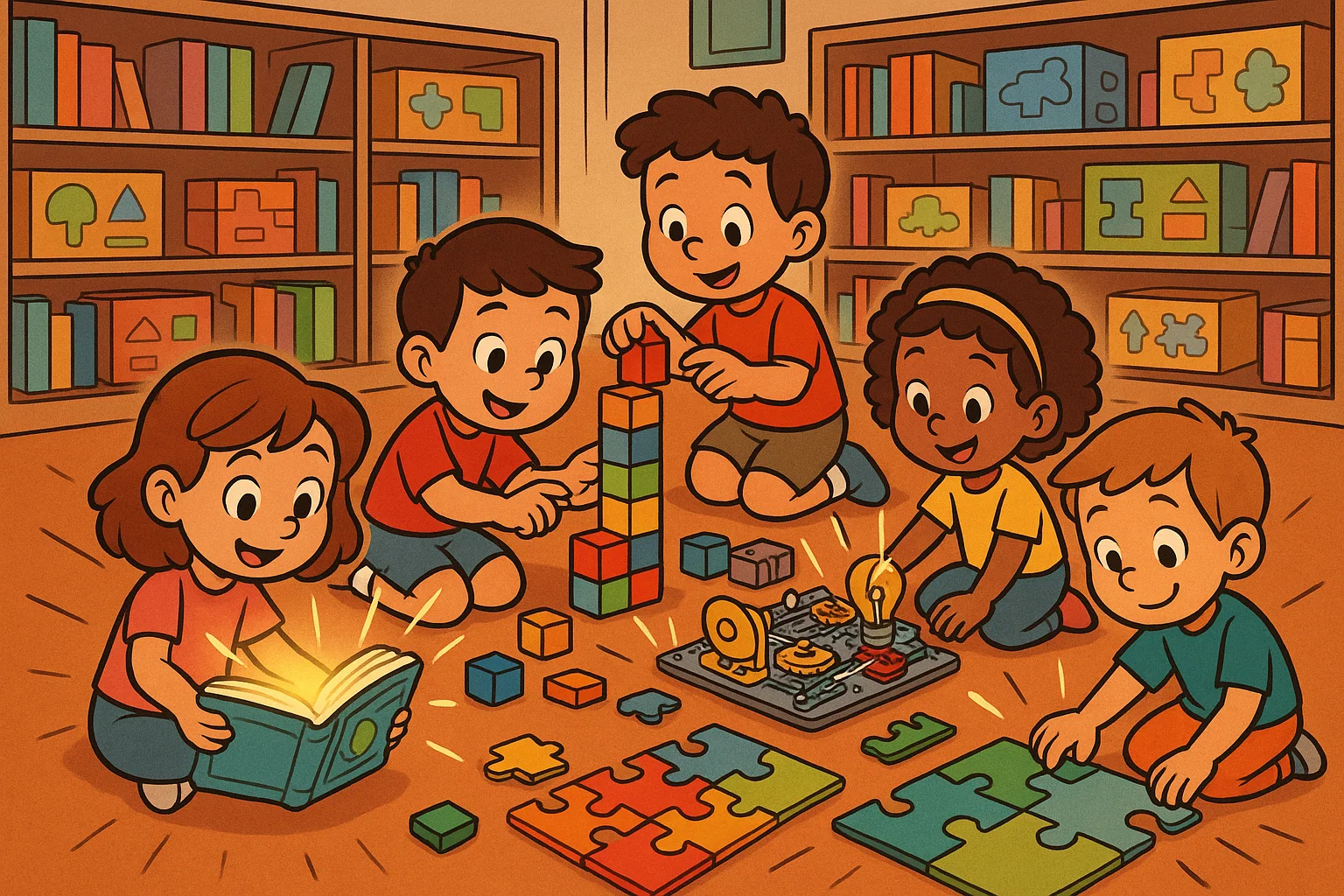
Educational toys that align with developmental needs can support learning while remaining engaging and fun. The best toys for kids with autism often focus on building specific skills like problem-solving, language development, and motor coordination through structured, predictable play experiences.
Cause-and-Effect Toys
Cause-and-effect toys strengthen logical thinking, sequencing abilities, and hand-eye coordination. These interactive sensory toys provide clear, predictable responses to actions, which appeals to children on the spectrum who thrive on consistency and understanding relationships between events.
Simple switch-activated toys, marble runs, and musical instruments that respond to touch all demonstrate cause-and-effect principles. These toys that encourage logical thinking help children understand that their actions have consequences, building confidence and encouraging further exploration and learning.
Puzzles and Sorting Games
Puzzles offer excellent opportunities to develop concentration, patience, and visual-spatial skills. Many kids with autism show natural aptitude for puzzles, finding the systematic approach and clear completion goal satisfying and rewarding.
Start with age-appropriate puzzles and gradually increase complexity. Wooden puzzles with large pieces work well for younger children, while older kids may enjoy 100+ piece jigsaw puzzles. Sorting games with colors, shapes, or categories help develop classification skills and attention to detail. These toys are an excellent way to support cognitive development.
Building Blocks and STEM Kits
Construction toys encourage creativity, spatial reasoning, and STEM learning while allowing children to engage in repetitive, systematic building activities. The open-ended nature of building blocks appeals to kids on the spectrum who enjoy creating structured, organized designs.
LEGO sets, magnetic building tiles, and age-appropriate science kits provide hours of engaging learning opportunities. These toys promote fine motor skills, planning abilities, and problem-solving strategies while supporting the individual’s natural interests and strengths.
Interactive Storybooks and Reading Apps
Digital storybooks and reading apps can support literacy development while accommodating different learning styles. Children on the spectrum often respond well to visual supports, making illustrated stories with audio narration particularly beneficial for children on the spectrum.
Look for apps that allow children to progress at their own pace, offer repetition options, and include interactive elements that maintain engagement. These tools can help develop reading comprehension, vocabulary, and storytelling skills in an accessible format that children can learn effectively.
Creative and Expressive Gifts
Creative activities provide valuable opportunities for emotional expression, sensory exploration, and building self-confidence. Art and music activities can be particularly therapeutic for kids with autism, offering non-verbal ways to communicate feelings and experiences.
Art Supplies
Safe, high-quality art materials open doors to creative expression and sensory play. Choose washable markers, non-toxic paints, and soft clay that provide various textures and creative possibilities without safety concerns. These gifts help children explore creativity safely.
Consider the individual’s sensory preferences when selecting art supplies. Some children may enjoy finger paints and textured materials, while others prefer clean tools like colored pencils or digital drawing tablets. Art activities help develop fine motor skills while providing calming, focused engagement.
Musical Instruments
Musical instruments offer unique sensory experiences through sound, vibration, and rhythm. Percussion instruments, keyboards, and simple string instruments can provide both calming and stimulating sensory input depending on the individual’s needs.
Music activities support emotional regulation, provide predictable patterns that children on the spectrum find comforting, and offer opportunities for self-expression. Consider the individual’s noise tolerance and choose instruments that won’t overwhelm sensitive hearing. These instruments offer therapeutic benefits and are especially helpful for children who respond well to auditory stimulation.
Dress-Up Costumes and Role Play
Pretend play materials support social skill development and provide opportunities for practicing communication in low-pressure situations. Costumes, play kitchen sets, and dollhouses encourage imaginative play while building understanding of social roles and relationships.
Role-playing activities help children practice social scripts, explore emotions, and develop empathy. Choose costumes and props that reflect the individual’s interests, whether that’s dinosaurs, superheroes, or community helpers. These gifts for autistic kids provide a unique way to explore social situations safely.
Social and Interactive Games
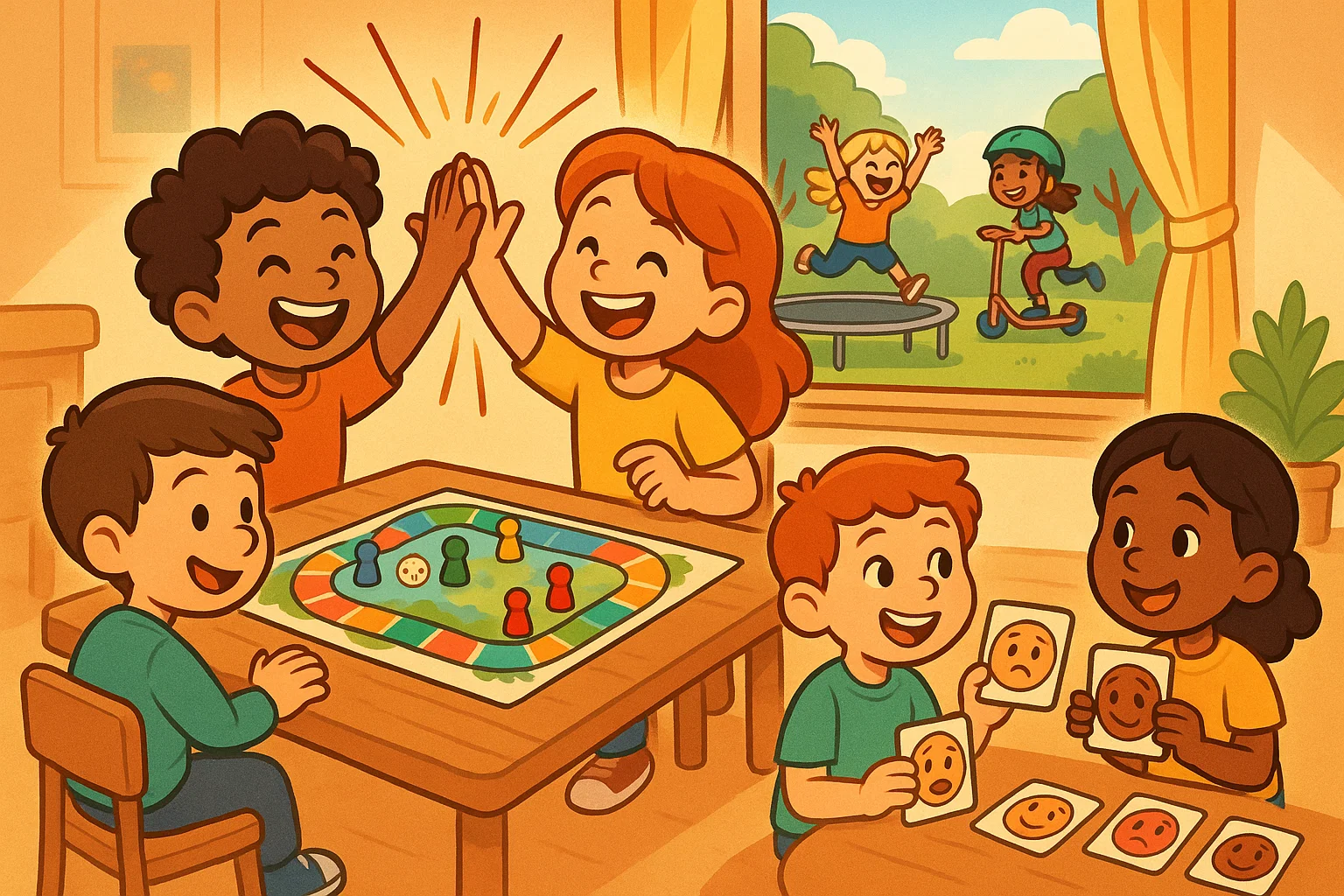
Games designed to encourage cooperation and communication can help children with autism develop social skills while having fun. The key is finding games that emphasize collaboration rather than competition, reducing anxiety while building connection.
Cooperative Board Games
Non-competitive games where players work together toward a common goal are ideal for children on the spectrum. These games reduce social pressure while teaching turn-taking, following rules, and collaborative problem-solving.
Games like “Hoot Owl Hoot” or “Race to the Treasure” encourage teamwork without creating winners and losers. The collaborative format helps children focus on enjoying the activity rather than managing competitive stress. These autism toys promote social interaction in comfortable ways.
Social Skills Flashcards
Visual learning tools like social skills flashcards help teach emotion recognition, facial expressions, and appropriate social responses. Children with autism spectrum disorder often benefit from explicit instruction about social cues that neurotypical children learn intuitively.
Choose cards that focus on specific skills like identifying emotions, understanding body language, or practicing conversation starters. Regular practice with these tools can build confidence in social situations and improve communication abilities. These tools help children develop essential social understanding.
Outdoor Play Equipment
Physical activity equipment encourages movement, provides sensory input, and creates opportunities for family interaction. Trampolines, scooters, and climbing structures support gross motor skills development while offering enjoyable exercise options.
Outdoor activities provide natural sensory experiences and help regulate energy levels. Choose equipment appropriate for the individual’s motor skills and safety awareness, always ensuring proper supervision and safety measures. These toys are made to withstand active play while supporting physical development.
Practical and Comfort-Based Gifts
Everyday items designed with autism in mind can significantly improve daily comfort and reduce stress around routine activities. These practical gifts show understanding of the unique challenges kids on the spectrum face.
Adaptive Clothing
Sensory-friendly clothing addresses common challenges like scratchy tags, tight seams, or uncomfortable textures. Tagless shirts, seamless socks, and soft fabrics can make dressing less stressful for children with tactile sensitivities.
Look for clothing with flat seams, soft materials, and easy-to-manage closures. Some companies specialize in adaptive clothing designed specifically for children with sensory processing differences, offering both comfort and age-appropriate style. These items reduce daily stress for children with autism.
Customizable Backpacks
Organized backpacks with multiple compartments and visual labeling systems help children manage their belongings independently. Clear organization reduces anxiety about lost items and supports developing independence skills.
Choose backpacks with external pockets, adjustable straps, and durable construction. Adding visual labels or color-coding systems can help children learn organizational skills while reducing daily stress about school or activity preparation. These backpacks support children with autism in developing life skills.
Visual Schedules and Organizers
Visual organization tools help reduce anxiety by making expectations clear and predictable. Picture schedules, calendar systems, and routine charts provide structure that kids on the spectrum find comforting and helpful.
Digital or physical visual schedules can be customized to the individual’s specific needs and interests. These tools support independence while reducing the stress that often comes with transitions and unexpected changes. Every child benefits from clear expectations and structured routines.
Subscription Services and Experience-Based Gifts
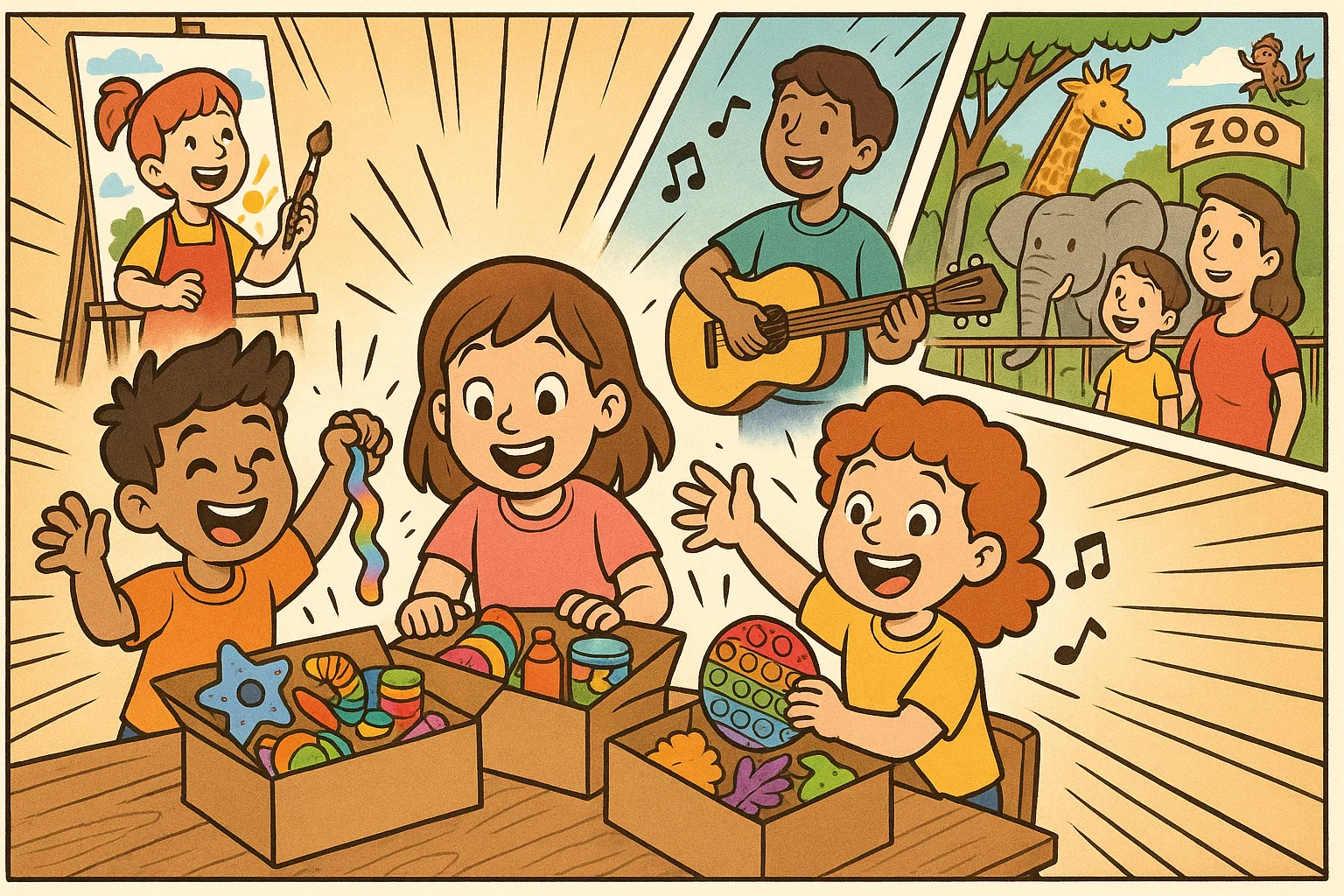
Non-physical gifts can provide ongoing joy and learning opportunities while creating anticipation and routine around regular deliveries or activities. These gift ideas for autistic children often provide better long-term value than single toys.
Subscription Boxes for Kids with Autism
Monthly subscription boxes deliver carefully curated sensory toys, educational activities, or STEM projects directly to your home. These services often focus specifically on autism-friendly materials and age-appropriate challenges.
Sensory subscription boxes may include fidget toys, craft materials, and calming tools. STEM boxes provide hands-on experiments and building projects that align with the interests of children who enjoy systematic exploration and learning. These gift ideas to help provide ongoing engagement.
Music or Art Classes
Structured creative classes provide social opportunities while focusing on individual expression and skill development. Many community centers and private studios offer classes specifically designed for children with special needs.
Group classes help children practice social skills in structured environments while pursuing personal interests. The regular schedule and familiar format often appeal to those who thrive on routine and predictability. These experiences are perfect for kids who benefit from structured learning environments.
Passes for Museums, Zoos, or Aquariums
Educational venues often offer autism-friendly programs, quiet hours, and sensory-supportive environments. Annual passes provide opportunities for repeated visits, allowing children to become familiar with spaces and explore interests deeply.
Many museums now offer sensory maps, quiet spaces, and specialized programming for visitors with autism or sensory processing needs. These real-world experiences support learning while providing valuable family bonding opportunities in accommodating environments.
Gifts by Age Group
Age-appropriate gift selection ensures safety, engagement, and developmental benefit. Understanding how autism presents differently across age groups helps narrow down the most suitable options when selecting gifts for kids.
Gifts for Toddlers and Preschoolers
Toddlers with autism benefit from sensory toys that are safe, durable, and encourage exploration. Soft puzzles with large pieces, textured balls, and simple cause-and-effect toys work well for this age group.
Young children often enjoy repetitive activities, so toys that can be used the same way repeatedly provide comfort and engagement. Safety is paramount – avoid small parts and choose toys made from non-toxic materials that can withstand thorough cleaning. These right toys support early development safely.
Gifts for Elementary Age Kids
Children aged 6-12 can handle more complex toys that challenge problem-solving abilities and support academic skills. STEM toys, intermediate puzzles, and art sets provide appropriate challenges while building confidence.
This age group often develops stronger interests in specific topics, making themed gifts particularly appealing. Whether the special child loves dinosaurs, trains, or space exploration, incorporating these interests into educational toys increases engagement and learning. These toys that help with skill development are ideal for school-age children.
Gifts for Teens
Teenagers on the spectrum may appreciate more sophisticated tools for managing sensory needs and expressing creativity. High-quality headphones, advanced art supplies, and complex building sets suit developing skills and interests.
Teen-appropriate gifts should support increasing independence while acknowledging ongoing support needs. Technology-based gifts like tablets with specialized apps or digital art tools often appeal to this age group. These tools help teens transition toward greater independence.
How to Choose the Best Gift for a Child with Autism
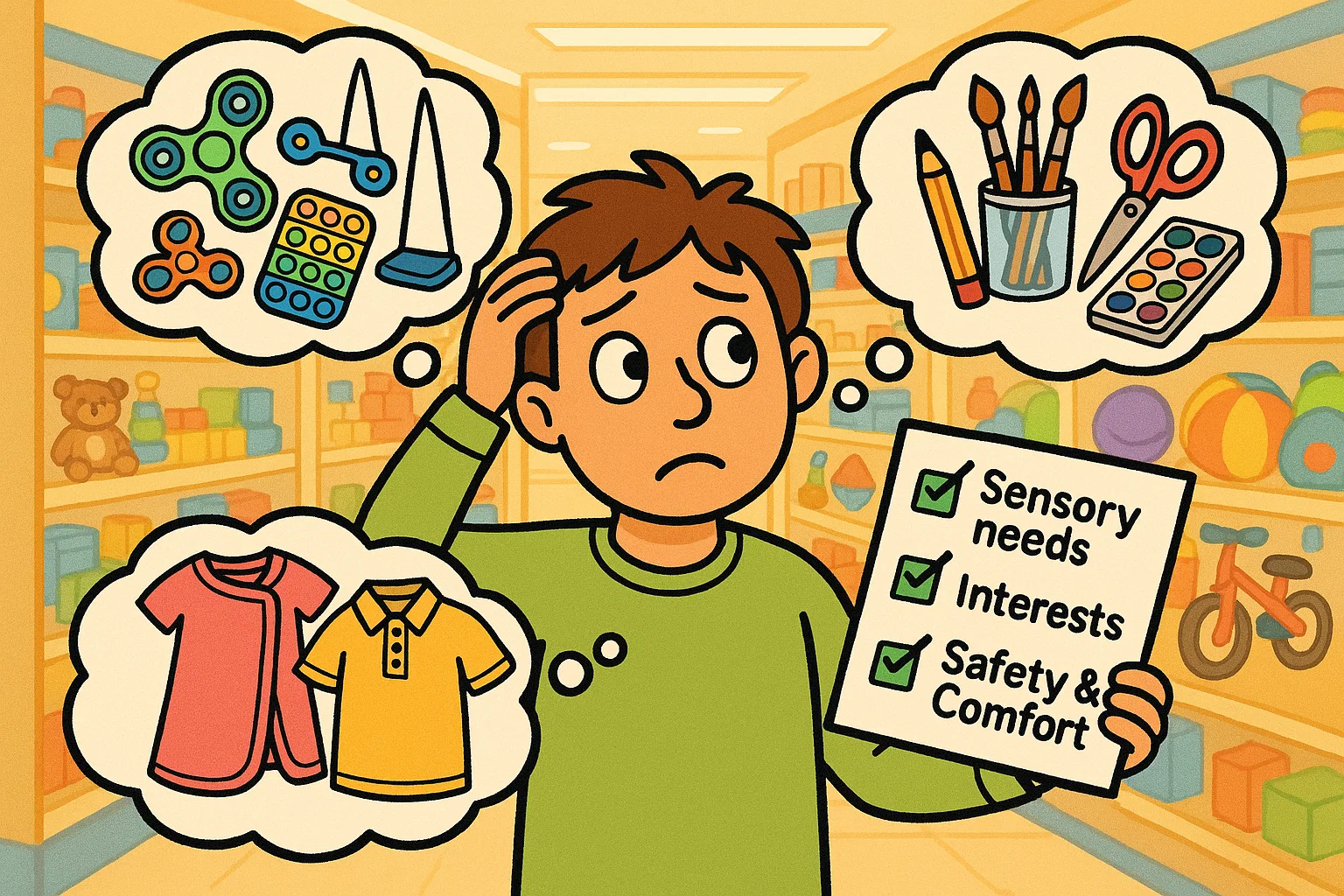
Selecting appropriate gifts requires understanding the individual’s needs, preferences, and developmental level. No two children on the spectrum are alike, which makes personalized gift selection essential.
Consider Sensory Preferences
Understanding whether an individual seeks or avoids certain sensory inputs guides gift selection significantly. Some children crave movement and pressure while others prefer quiet, gentle activities that don’t overwhelm their sensory systems.
Observe how the individual responds to different textures, sounds, and activities in their daily life. This information provides valuable clues about which types of sensory gifts will be most beneficial and enjoyable. These observations help children improve their focus and regulation.
Match Gifts to Interests
Kids with autism often develop intense interests in specific topics or activities. Incorporating these special interests into gift selection dramatically increases the likelihood of positive engagement and long-term use.
Whether the individual loves animals, vehicles, numbers, or music, building on existing passions shows understanding and respect for individual preferences. These interests often serve as pathways to learning and social connection. Children enjoy activities that align with their natural curiosities.
Focus on Safety and Comfort
Safety considerations go beyond age-appropriate warnings to include understanding individual behavioral patterns and sensory needs. Choose durable, non-toxic materials that won’t create safety hazards if used in unexpected ways.
Consider the individual’s tendency toward oral exploration, throwing behaviors, or intense manipulation of objects. Select gifts that can withstand the interaction style while remaining safe and functional over time. The appropriate gift balances engagement with safety considerations.
Wrapping Up
The perfect gift for an individual with autism demonstrates understanding, support, and celebration of unique needs and strengths. Whether you choose sensory tools, educational toys, creative materials, or practical items, the most important element is thoughtful consideration of individual preferences and developmental goals.
Remember that the best present often isn’t the gift itself, but the time, patience, and understanding you bring to sharing it with the individual. Your presence, encouragement, and willingness to engage create the most meaningful gift of all—connection and acceptance. This gift list represents just the beginning of showing care and support.
FAQs
What toys do autistic kids enjoy most?
Kids on the spectrum often gravitate toward toys that provide predictable cause-and-effect relationships, sensory input, or align with their special interests. Popular choices include fidget toys, building blocks, puzzles, and sensory tools like deep pressure items or noise-cancelling headphones. The key is matching toys to individual preferences rather than assuming all children on the spectrum like the same things.
What calms autistic children?
Calming strategies vary by individual, but common effective tools include deep pressure input from therapeutic blankets, gentle swinging motion, soft background music or white noise, and familiar routines. Help children find comfort in sensory toys they can squeeze or manipulate, quiet spaces where they can retreat, and activities that engage their special interests. These tools soothe and provide regulation support.
What gifts support social skills?
Cooperative board games, social skills flashcards, and role-play materials like dress-up costumes help develop social abilities. Interactive storybooks that focus on emotions and relationships, turn-taking games, and group art projects also provide opportunities to practice social skills in enjoyable, low-pressure settings. These gifts for children with autism promote social development naturally.
How do I know if a gift is sensory-friendly?
Sensory-friendly gifts typically have adjustable features, use soft or interesting textures, provide calming input rather than overstimulation, and avoid sudden loud noises or bright flashing lights. Look for products specifically labeled as autism-friendly or designed for sensory processing needs, and consider the individual’s sensory preferences and sensitivities. Autistic people have varying sensory needs that should guide selection.

